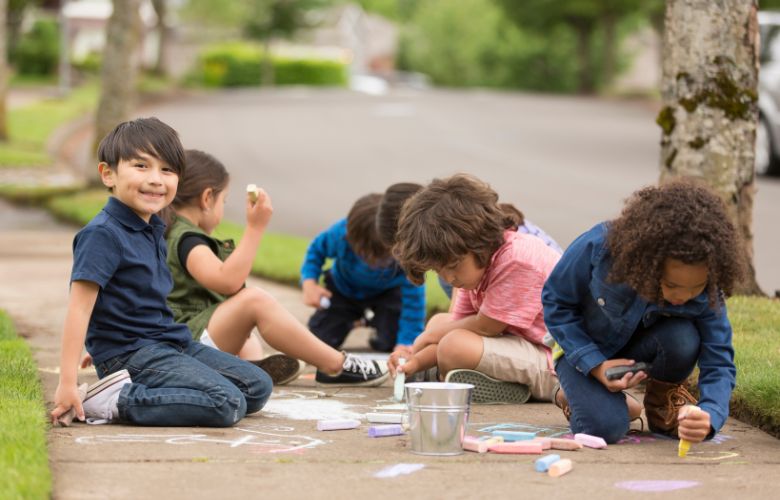Introduction
The drums are a wonderful instrument to teach your child. When you teach them how to play, you can help them develop their motor skills and hand-eye coordination. Playing the drums can also help them develop their rhythm, which is a skill that will serve them well in many other areas of life. Learning to play drums can be an excellent way for kids to develop their coordination, concentration, and overall musical skill. It’s not only fun but also helps build self-confidence and coordination that will last far beyond the years spent banging away at the kit.
Self-Confidence

Self-confidence is a key element to success in life. It’s also a key element to success in music. When you play an instrument, you’re not just learning how to play that instrument: you’re learning how to be confident about your abilities, and how to be confident enough that you can share them with others.Confident children know they can do anything they set their minds to. They do not let failures stand in their way and they are motivated by success. These children will also be more likely to succeed than those who lack confidence because they know that failure is just a temporary setback and not an indication of something wrong with them as people or their abilities.A child who lacks confidence may struggle with social situations because he does not believe he has anything worthwhile to offer others around him; this can lead to feelings of depression or loneliness which can have negative consequences on both physical health and mental health later in life.Drumming is a great way to help your child build self-confidence. Drumming has been shown to release endorphins and increase dopamine levels in the brain, which makes it highly addictive. This can be good for people who are suffering from anxiety or depression, as well as those with social anxiety. Playing drums or acoustic drum kits also improves memory, concentration, and spatial awareness as well as hand-eye coordination. These all combine to make your child more confident in their abilities at everything they do.While drumming can do wonders for your child’s mental health and help them become more confident in themselves, you mustn’t pressure them into playing if they aren’t interested or ready yet – no matter how much you want them to be.
Concentration and Coordination Skills

Playing the drums requires concentration, which is an important skill for learning. If you’re teaching your child to play the drums, they’ll have to learn how to concentrate on what they’re doing and not let their mind wander too much. This can help them in other areas of life as well. For example, if your child has trouble concentrating when studying for a test at school or paying attention during story time at bedtime, drumming can help them become a better student overall by helping them improve their concentration skills.
Children who can concentrate on a task and finish it without being distracted are more likely to be successful in their studies, at work, and in their relationships with others. They are more likely to achieve more socially and professionally because they can stay focused on the task at hand rather than getting distracted by other things around them.
Concentration also helps children learn how to focus their attention on one thing at a time, rather than jumping from task to task or activity to activity as soon as something else grabs their attention. This ability will help them perform well at school or work as adults because they will be able to focus on the tasks they need to complete instead of getting distracted by social media or other forms of entertainment while they’re trying to get work done.
Drumming also involves coordination between both hands and feet, so it can also help children develop coordination skills as well. Coordination is essential for playing music because it allows you to play different notes at the same time on different instruments within an ensemble like when two drummers hit cymbals together (or even just one drummer hits two different cymbals).
The ability to coordinate involves the use of different parts of the body together in route an action. For example, when you swing your arm while playing baseball it involves your hand and shoulder working together to make contact with the ball. If one part of your body was not working properly or did not respond quickly enough then you would not be able to catch or throw the ball correctly. A child with poor coordination skills may struggle with activities such as catching because they cannot coordinate their hands and arms together when moving them towards something like a ball or another person’s hand; whereas someone who has good coordination skills will catch things easily because they can use both hands together quickly and accurately even if there are obstacles in between them such as other people’s hands or fingers blocking their path towards where they want to go reach out for.
Working as a Team Member

Teaching your child to play the drums is a great way to help them develop their musical skills and prepare them for a successful music career. In addition, it also gives your child a chance to learn how to work as part of a team and how to collaborate with others who are in charge of different aspects of the music.
Drums are an important part of any band or orchestra, which means that they will be able to play alongside other musicians in these settings. Because there are so many different parts involved in creating music, teaching your child how to play the drums will teach him or her how each part fits together and works together as a whole. This will allow him or her to develop his or her unique style while still working within an established structure.
Teaching your child how to play the drums is a great way for them to learn how important it is for every single person on the team, no matter what their position, to be on time and prepared for their practice and game. If one person is late or unprepared, then everyone suffers because they are all dependent on each other. If you want your child to understand this concept early in life, then drumming may be an excellent outlet for teaching them about it.
Release of Emotions

One of the best ways to encourage your child to drum is by letting them know that it’s a very effective way of releasing emotions healthily. Drumming allows people to experience a wide range of emotions, from anger and stress to happiness and joy. If you notice that your child is having difficulty expressing his or her feelings through words, then this could be an excellent outlet for them.
Drumming has been shown to have therapeutic effects on people with physical and mental disabilities, as well as cardiovascular diseases including heart failure, high blood pressure, and coronary artery disease. It also helps relieve stress and anxiety, which are common problems for many people. Playing drums can help you express your feelings in a healthy way, rather than bottling them up inside where they might be more destructive or even harmful.
Drumming is also a great way to connect with others and strengthen relationships between family members or friends. It can bring people together who may not otherwise spend much time together; drum circles are often formed by people who enjoy playing music together but don’t necessarily have any other connection besides their shared interest in playing drums. Drumming can be a great way to bond with other people who share your interests and passions and it’s also fun.
Coordination of Eye and Hand Movements
Coordination of eye and hand movements. This is one of the most important aspects of drumming that children can learn, and it’s also an important skill for many other activities. Drumming teaches your child how to use her hands together with her eyes to create music. Eye-hand coordination is necessary for drawing, playing sports, and many other activities as well. If you’re interested in helping your child improve his visual-motor skills, or if he already has difficulties with this type of coordination, then drumming could be a great way to help him develop those skills further.
Improved Memory

You can’t forget the beat, rhythm, and song because they’re engrained in your brain. And it’s not just drumming any instrument that will do this.
Playing the drums is a great way to improve memory. The act of learning to play a musical instrument involves repetition, and repetition is one of the best ways to improve your memory. In addition, playing an instrument requires you to pay attention to what you’re doing, which helps you focus on what’s happening around you and can improve your ability to remember things. Memory is a skill that is important for children to develop to succeed in school and life. Playing the drums allows them to practice these skills, which can help them become more successful students and more confident people in general.
Self-confidence, concentration, working as a team member and more are advantages to teaching your child to play the drums.
Concentration: When kids play drums, they are required to pay attention closely because it requires coordination between their eyes and hands. As a result, children who play drums tend to have better concentration skills than those who do not. This helps them improve their ability at school as well.
Conclusion
The drums are a great instrument for children to learn, not just because it’s fun, but because it teaches them valuable lessons about teamwork and self-confidence. It’s also an excellent way to release your emotions, and improve your memory and coordination of eye-hand movements.
Recommended





